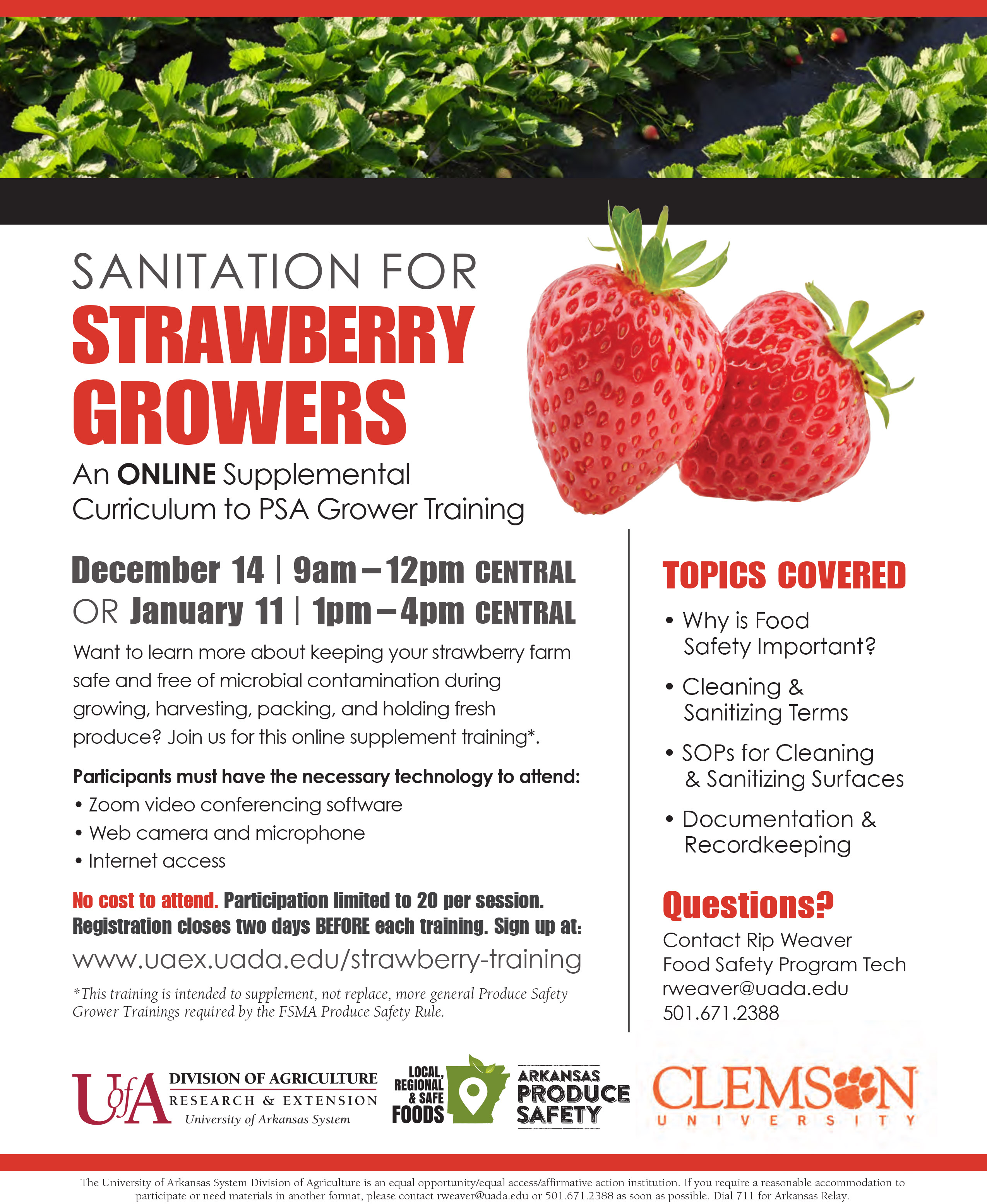Dec. 3, 2021
Division of Agriculture to offer online supplemental sanitation training for strawberry growers
By Rebekah Hall
U of A System Division of Agriculture
Fast Facts:
- Supplemental curriculum to PSA grower training
- Participation is free; two dates available
- Register at uaex.uada.edu/strawberry-training
(459 words)
LITTLE ROCK — Strawberry growers across the country will have two opportunities to learn more about keeping their farms safe and free of microbial contamination through free online training hosted by the University of Arkansas System Division of Agriculture and Clemson University. The training dates are Dec. 14, 2021 from 9 a.m.-12 p.m. and Jan. 11, 2022 from 1 p.m.-4 p.m. Registrants can choose either option and do not need to attend both.
“The Division of Agriculture and Clemson University have partnered on this alternative curriculum beyond the standard Food Safety Modernization Act (FSMA) Produce Safety Alliance Grower Trainings to support the strawberry specialty crop industry,” said Amanda Philyaw Perez, extension food safety specialist and Assistant Professor for the Division of Agriculture.
“Participants in these trainings will learn the importance of food safety, various cleaning and sanitizing terms, standard operating procedures for cleaning and sanitizing surfaces, and documentation and recordkeeping,” said Rip Weaver, extension program technician for the Division of Agriculture. “While these trainings are tailored for strawberry growers, these food safety principles may be applied to all aspects of farming operations. The idea is to create a culture of farm and food safety with a focus on strawberry production.”
Division of Agriculture faculty Philyaw Perez and Kristen Gibson, associate professor of food safety and microbiology for the Division of Agriculture, in collaboration with Angela Fraser, professor of food science at Clemson University, designed the training program. The program is funded through the U.S. Department of Agriculture’s National Institute of Food and Agriculture Food Safety Outreach Competitive Grant Program (FSOP). It is the first time this training is being offered
Julia Fryer, a program associate for the Division of Agriculture, and Natacha Cureau, former extension postdoctoral fellow, assisted in the research upon which the training is based in 2020.
“Strawberry growers from around the country were surveyed about what information and training they desired, and results found that growers wanted more information on sanitizing, cleaning, recordkeeping and documentation,” Philyaw Perez said. “They recognize their gaps in knowledge, and we aim to support them in bridging this gap through these trainings. This workshop is designed to build on food safety knowledge, specifically for the strawberry industry.”
The training is intended to supplement, not replace, general Produce Safety Grower training required by the FSMA Produce Safety Rule. Philyaw Perez and the Produce Safety team have led produce safety education for Arkansas Division of Agriculture growers for the past four years. There is no cost to participate in the training, but registration is required. Participation is limited to 20 per session. Registration closes two days before each training. Participants will need Zoom video conferencing software, a web camera and microphone, and internet access to attend. For more information, contact Rip Weaver at rweaver@uada.edu.
To learn about extension programs in Arkansas, contact your local Cooperative Extension Service agent or visit www.uaex.uada.edu. Follow us on Twitter and Instagram at @AR_Extension. To learn more about Division of Agriculture research, visit the Arkansas Agricultural Experiment Station website: https://aaes.uark.edu. Follow on Twitter at @ArkAgResearch. To learn more about the Division of Agriculture, visit https://uada.edu/. Follow us on Twitter at @AgInArk.
About the Division of Agriculture
The University of Arkansas System Division of Agriculture’s mission is to strengthen agriculture, communities, and families by connecting trusted research to the adoption of best practices. Through the Agricultural Experiment Station and the Cooperative Extension Service, the Division of Agriculture conducts research and extension work within the nation’s historic land grant education system.
The Division of Agriculture is one of 20 entities within the University of Arkansas System. It has offices in all 75 counties in Arkansas and faculty on five system campuses.
Pursuant to 7 CFR § 15.3, the University of Arkansas System Division of Agriculture offers all its Extension and Research programs and services (including employment) without regard to race, color, sex, national origin, religion, age, disability, marital or veteran status, genetic information, sexual preference, pregnancy or any other legally protected status, and is an equal opportunity institution.
# # #
Media contact:
Rebekah Hall
Cooperative Extension Service
Department of Communications
rkhall@uada.edu
